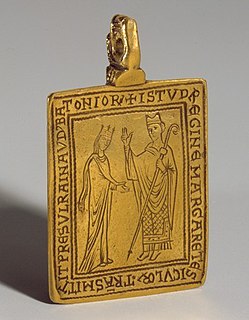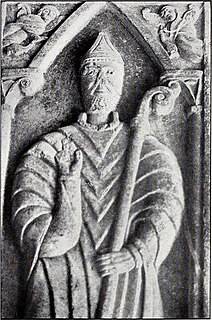Related Research Articles
Leofric was a medieval Bishop of Exeter. Probably a native of Cornwall, he was educated on the continent. At the time Edward the Confessor was in exile before his succession to the English throne, Leofric joined his service and returned to England with him. After he became king, Edward rewarded Leofric with lands. Although a 12th-century source claims Leofric held the office of chancellor, modern historians agree he never did so.

Richard Poore or Poor was a medieval English bishop best known for his role in the establishment of Salisbury Cathedral and the City of Salisbury, moved from the nearby fortress of Old Sarum. He served as Bishop of Chichester, Bishop of Salisbury and Bishop of Durham.
Geoffrey Rufus, also called Galfrid Rufus was a medieval Bishop of Durham and Lord Chancellor of England.

Reginald fitz Jocelin was a medieval Bishop of Bath and an Archbishop of Canterbury-elect in England. A member of an Anglo-Norman noble family, he was the son of a bishop, and was educated in Italy. He was a household clerk for Thomas Becket, but by 1167 he was serving King Henry II of England. He was also a favourite of King Louis VII of France, who had him appointed abbot of the Abbey of Corbeil. After Reginald angered Becket while attempting to help negotiate a settlement between Becket and the king, Becket called him "that offspring of fornication, that enemy to the peace of the Church, that traitor." When he was elected as a bishop, the election was challenged by King Henry's eldest son, Henry the Young King, and Reginald was forced to go to Rome to be confirmed by Pope Alexander III. He attended the Third Lateran Council in 1179, and spent much of his time administering his diocese. He was elected Archbishop of Canterbury in 1191, but died before he could be installed.
Gerard la Pucelle was a peripatetic Anglo-French scholar of canon law, clerk, and Bishop of Coventry.
Robert Neville was an English prelate who served as Bishop of Salisbury and Bishop of Durham. He was also a provost of Beverley. He was born at Raby Castle. His father was Ralph Neville and his mother was Joan Beaufort, daughter of John of Gaunt. He was thus a highly placed member of the English aristocracy.
Osbern FitzOsbern was a Norman churchman. He was a relative of King Edward the Confessor as well as being a royal chaplain. During Edward's reign he received the church at Bosham, near Chichester. He was one of those present at the consecration of Westminster Abbey at Christmas 1065. He was a steward for King William I of England during his reign, as well as being a friend of the king. The story that he became William's chancellor is based entirely on a charter that modern historians have declared mostly spurious. He became Bishop of Exeter in 1072, and was consecrated at St. Paul's in London on 27 May 1072 by the Archbishop of Canterbury, Lanfranc.
Robert the Lotharingian was a priest who became Bishop of Hereford following the Norman Conquest of England. His writings serve as one of the best sources for information on the process of compiling the Domesday Book, and he may have introduced the abacus to England.

Ralph de Luffa (or Ralph Luffa was an English bishop of Chichester, from 1091 to 1123. He built extensively on his cathedral as well as being praised by contemporary writers as an exemplary bishop. He took little part in the Investiture Crisis which took place in England during his episcopate. Although at one point he refused to allow his diocese to be taxed by King Henry I of England, Luffa remained on good terms with the two kings of England he served.
William of Bitton was a medieval English Bishop of Bath and Wells.
Simon of Wells was a medieval Bishop of Chichester.
Robert Peche was a medieval Bishop of Coventry.
Richard Peche was a medieval Bishop of Lichfield.
Robert Warelwast was a medieval Bishop of Exeter.

Bartholomew of Exeter was a medieval Bishop of Exeter. He came from Normandy and after being a clerk of the Archbishop of Canterbury, was made Archdeacon of Exeter in 1155. He became Bishop of Exeter in 1161. Known for his knowledge of canon law, he was involved in the Becket controversy after the appointment of Thomas Becket as Archbishop of Canterbury. After Becket's death, although he was frequently at the royal court, he mainly attended to his diocese. A number of works by him survive, including sermons and treatises on law and theology.
John the Chanter was a medieval Bishop of Exeter.
Henry Marshal was a medieval Bishop of Exeter.
William Briwere was a medieval Bishop of Exeter.

Richard Blund was a medieval Bishop of Exeter.

Peter Quinel was a medieval Bishop of Exeter. He became a canon of Exeter Cathedral in 1276 and his episcopate began in 1280 and continued until he died in 1291. He issued a set of rules governing the clergy in his diocese and the required furnishing of churches and continued the rebuilding efforts at Exeter Cathedral.
References
- Barlow, Frank (2004). "Chichester, Robert of". Oxford Dictionary of National Biography (online ed.). Oxford University Press. doi:10.1093/ref:odnb/5279.(Subscription or UK public library membership required.)
- Fryde, E. B.; Greenway, D. E.; Porter, S.; Roy, I. (1996). Handbook of British Chronology (Third revised ed.). Cambridge, UK: Cambridge University Press. ISBN 0-521-56350-X.